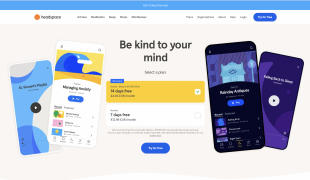- 3808
- 387
- 9
- 7
- 0
- Help Ukraine
About the solution
More than 1% of people in the world stutter; and one of them is Gareth Walkom, a 24-year-old student at Nottingham Trent University in the UK. He has been stuttering since the age of six, and it has affected him throughout his life. From the fear of talking to someone that he doesn't know to trying to say his name. correctly and clearly, Gareth knows firsthand how unbearable a stutter can sometimes be, and he wanted to help people like himself to control their stutter.
This led Gareth to build a Virtual World to help people who stutter, and so withVR was born!
This virtual space allows patients to practice their speech, where they can interact with an avatar about everyday things. This is very realistic, animated, and as the conversation flows the patient's gazed behaviors are being monitored and registered. For example, if someone who stutters looks away from the avatar during the moment of a stutter, they will be told this, meaning that the whole purpose of this system is to prepare the individual for anxiety-provoking real-life situations.
Taking into consideration that one of the difficulties in adapting to any disability is the opportunity to work through it in a safe and nonjudgmental environment. this solution provides a virtual space for individuals, in collaboration with their speech therapists, to practice real-world speaking scenarios in safe, controlled environments.
Learn more about this solution here https://withvr.app/
This story was adapted from https://cloud.google.com/blog/topics/startups/discover-how-virtual-reali... and https://www.vice.com/en/article/kby5bm/a-young-developer-is-building-a-v...
All the images have been taken from https://withvr.app/treat/, as we do not own any of them.
这些解决方案不应包括使用药物,化学品或生物制品(包括食品);创伤性设备;冒犯性的,商业或内在危险的内容。该解决方案未经医学验证。请谨慎进行!如果您有任何疑问,请咨询健康专家。
DISCLAIMER: This story was written by someone who is not the author of the solution, therefore please be advised that, although it was written with the utmost respect for the innovation and the innovator, there can be some incorrect statements. If you find any errors please contact the patient Innovation team via info@patient-innovation.com
-
-
426
-
0
-
5603

Dad combines devices to help disabled child use computers
COMMUNICATION: Communicating, whether by speaking, listening, or other means
Playing
Cerebral Palsy
Assistive Technology access
AI algorithm
Restoring mobility
Promoting self-management
Managing Neurological Disorders
Promoting inclusivity and social integration
Improving Speech and Communication
Preventing (Vaccination, Protection, Falls, Research/Mapping)
Raise awareness
Child and Adolescent Psychiatry
General and Family Medicine
Neurology
Pediatrics
Canada
-
-
-
302
-
0
-
3521

The Former Buddhist Monk Andy Puddicombe, creates a Meditation App for Mental Health
CAREGIVING
COMMUNICATION: Communicating, whether by speaking, listening, or other means
Meditation
Depressive Disorders (Major Depression, Childhood Depression, Postpartum Depression)
App (Including when connected with wearable)
Anxiety
Social withdrawal or isolation
Depressed Mood
Loss of interest or pleasure in activities (anhedonia)
Fatigue
Sleep disturbances
Managing pain
Enhancing health literacy
Promoting self-management
Promoting inclusivity and social integration
Enhancing Mental Health
Improving Speech and Communication
General and Family Medicine
Neurology
Psychiatry
United Kingdom
-
-
-
390
-
0
-
4087

How a deaf girl is improving communication with Comunify.
COMMUNICATION: Communicating, whether by speaking, listening, or other means
Social interaction
Hearing Disorders
App (Including when connected with wearable)
Enhancing health literacy
Promoting self-management
Promoting inclusivity and social integration
Improving Speech and Communication
Raise awareness
Caregiving Support
General and Family Medicine
Internal Medicine
Pediatrics
Physical Medicine and Rehabilitation
Psychiatry
United States
-
 zh
zh